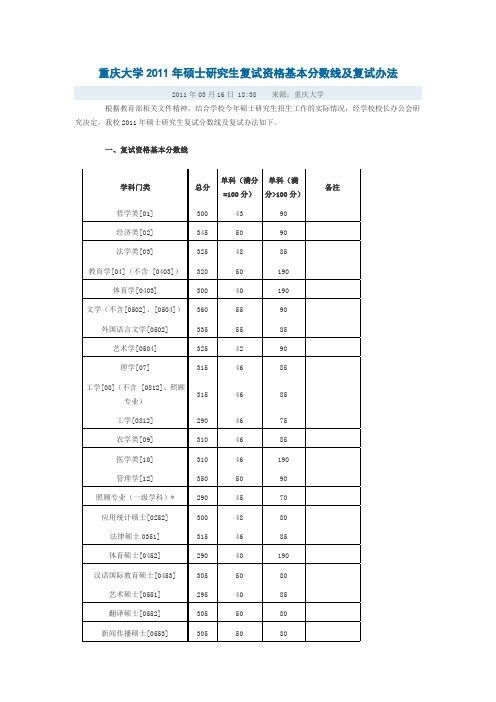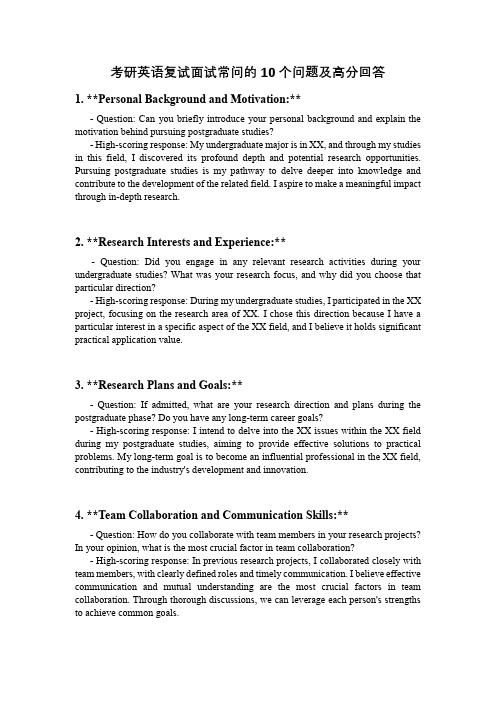重庆大学建管学院考研复试英语面试
重庆大学2009--2011年硕士研究生复试资格基本分数线及复试办法

重庆大学2011年硕士研究生复试资格基本分数线及复试办法2011年03月16日 18:38 来源:重庆大学根据教育部相关文件精神,结合学校今年硕士研究生招生工作的实际情况,经学校校长办公会研究决定,我校2011年硕士研究生复试分数线及复试办法如下。
一、复试资格基本分数线学科门类总分单科(满分=100分)单科(满分>100分)备注哲学类[01] 300 43 90经济类[02] 345 50 90法学类[03] 325 48 85 教育学[04](不含 [0403])320 50 190 体育学[0403] 300 40 190 文学(不含[0502]、[0504])360 55 90 外国语言文学[0502] 335 55 85 艺术学[0504] 325 42 90 理学[07] 315 46 85 工学[08](不含 [0812]、照顾专业)315 46 85 工学[0812] 290 46 75农学类[09] 310 46 85医学类[10] 310 46 190管理学[12] 350 50 90 照顾专业(一级学科)* 290 45 70 应用统计硕士[0252] 300 48 80 法律硕士0351] 315 46 85体育硕士[0452] 290 40 190 汉语国际教育硕士[0453] 305 50 80 艺术硕士[0551] 295 40 85翻译硕士[0552] 305 50 80 新闻传播硕士[0553] 305 50 80建筑学硕士[0851] 290 45 80工程硕士[0852] 290 45 75管理类硕士 [125] 160 50 100参加全国统考,享受少数民族报考学科总分下降10分,单科成绩不变。
政策的考生**说明:1、照顾专业(一级学科):力学[0801]、冶金工程[0806]、动力工程及工程热物理[0807]、地质资源与地质工程[0818]、矿业工程[0819]2、享受少数民族政策的考生:报考重庆大学,且毕业后在国务院公布的民族区域自治地方就业的少数民族普通高校应届本科毕业考生;或工作单位在国务院公布的民族区域自治地方,为原单位委托培养的少数民族在职人员考生。
考研复试英语面试题目

考研复试英语面试题目1. Can you introduce yourself briefly?(请简要介绍一下你自己。
)2. Why do you choose to pursue a postgraduate degree?(你为什么选择攻读研究生学位?)3. What are your research interests and why?(你的研究兴趣是什么,为什么选择这个方向?)4. What is your career goal or plan after completing your postgraduate studies?(你在完成研究生学习后的职业目标或规划是什么?)5. Can you briefly introduce your undergraduate thesis?(请简要介绍一下你的本科论文。
)6. What difficulties did you encounter during your research? How did you overcome them?(你在研究过程中遇到了什么困难?你是如何克服它们的?)7. Do you have any research achievements or publications?(你是否有任何研究成果或发表的论文?)8. Have you participated in any academic conferences or activities? Can you share your experiences?(你是否参加过任何学术会议或活动?你能分享一下你的经历吗?)9. How do you plan to balance your study and life during your postgraduate studies?(你打算如何在研究生学习期间平衡学习和生活?)10. Do you have any questions for us?(你有什么问题要问我们吗?)。
考研复试英语口语常问的16个问题,附回答模板!

考研复试英语口语常问的16个问题,附回答模板!面试常问的问题还有回答模板在此,需要的同学就赶快结合自己的经历动笔写一下,然后就抓紧时间背背背!一、复试评分复试中的口试要求主要是从以下两个方面进行评价:①考查学生理解并回答有关日常生活、家庭、工作、学习等问题的能力(3分钟)。
②考查学生连续表达的能力。
考生从所给的问题中选择一个话题,就此话题表达自己的看法(3分钟)。
二、考场注意1、第一句话见到考官的第一句话,很关键,不用说的很复杂。
可以是一个简单句,但一定要铿锵有力。
展示出自信和实力。
千万不要来一句“Sorry, my English is poor”。
常见的开头有:I am glad to be here for this interview. First let me intr-oduce myself. I’m ...(姓名), my Number is…(编号).因为大多数高校,会让不少同学通过复试,所以参加面试的同学可能会有很多,每位同学可能会有一个考生编号,说一下自己的编号会显得很职业,正式。
2、自我介绍作自我介绍——成长经历(making a self-introduction ——developing history),有很多学校要求做一个自我介绍,但是你要注意的是,这个问题并不是在请你大谈你的个人历史。
而是考官要在你的介绍中,找到有关你性格、资历、志向和生活动力等的线索。
另外在介绍性格和爱好的时候,可以适当地结合一下家庭介绍,可以说说父母给了你哪些良好的影响,千万不要流水帐似的介绍家庭成员……在这里,跨考教育也搜集了些描述个人品质常用词汇的中英文对照,可以参考一下~3、没听懂问题怎么办?如果考官问其他的问题,但是没有听明白,一定要保持微笑,然后用任意一句回答:。
研究生复试 英语问题集锦(应试方法+_自我介绍模板+面试官常问问题)

一. 了解报考院校专业往年的英语口试形式各院校各专业的复试口试形式各不相同,一定要对症下药。
可以通过询问以前考过的师兄、师姐们来了解复试口试的形式,可能的话,了解一下口试中常出现的问题。
总的来说,复试口试有这样几种类型:自我介绍;读某篇英文文章,然后进行翻译或回答相关问题;抽到某个话题进行演讲、阐述;两三人就同一个话题进行讨论、辩论(多人一起复试的情况);自由问答(可能是专业或与专业相关的时事热点问题,也可能只是了解个人情况)。
二. 了解导师/考官首先必须了解导师在该专业的研究方向,可能的话,看看他们写的书,因为在专业问题上,导师一般都会往自己研究方向上靠拢;其次,了解导师在口试中常问的一些问题及习惯(这个又得求助于师兄师姐们了);最后,可以给导师打电话,让他/她知道你是谁,有你这么一个考生参加复试。
三. 对以下几个方面要多加注意,适当练习几遍1、见面问候语:Good morning / afternoon, dear professors. I am XXX. (Nice to meet you。
)。
告别用语:Thanks for your time. / Thank you for giving such a chance. I hope to see you again and soon。
2、自我介绍篇(重点)。
基本上每个院校每个专业的口试中都会涉及这一方面。
考官其实是要借此了解你的口头表达能力以及你的报名表之外的一些信息。
自我介绍时间以2-3分钟为宜。
思路要清楚,要突出重点,口语尽量流利(不要太流利了,有背诵之嫌)。
1) 考官要求你作自我介绍时,不要用…let me introduce myself briefly / please allow m e to introduce myself to you等句子,重复、啰嗦。
开头可以只用一句话引入:Dear professors, I feel so glad to meet all of you here.然后就可以进入主题,介绍姓名、年龄等等。
考研英语复试面试常问的10个问题及高分回答

考研英语复试面试常问的10个问题及高分回答1. **Personal Background and Motivation:**- Question: Can you briefly introduce your personal background and explain the motivation behind pursuing postgraduate studies?- High-scoring response: My undergraduate major is in XX, and through my studies in this field, I discovered its profound depth and potential research opportunities. Pursuing postgraduate studies is my pathway to delve deeper into knowledge and contribute to the development of the related field. I aspire to make a meaningful impact through in-depth research.2. **Research Interests and Experience:**- Question: Did you engage in any relevant research activities during your undergraduate studies? What was your research focus, and why did you choose that particular direction?- High-scoring response: During my undergraduate studies, I participated in the XX project, focusing on the research area of XX. I chose this direction because I have a particular interest in a specific aspect of the XX field, and I believe it holds significant practical application value.3. **Research Plans and Goals:**- Question: If admitted, what are your research direction and plans during the postgraduate phase? Do you have any long-term career goals?- High-scoring response: I intend to delve into the XX issues within the XX field during my postgraduate studies, aiming to provide effective solutions to practical problems. My long-term goal is to become an influential professional in the XX field, contributing to the industry's development and innovation.4. **Team Collaboration and Communication Skills:**- Question: How do you collaborate with team members in your research projects? In your opinion, what is the most crucial factor in team collaboration?- High-scoring response: In previous research projects, I collaborated closely with team members, with clearly defined roles and timely communication. I believe effective communication and mutual understanding are the most crucial factors in team collaboration. Through thorough discussions, we can leverage each person's strengths to achieve common goals.5. **Self-Improvement and Overcoming Challenges:**- Question: What was the most significant challenge you faced in academic research or team collaboration? How did you overcome it?- High-scoring response: In one research project, we encountered challenges related to XX. I adopted approaches such as in-depth literature review, seeking advice from mentors and peers. This experience strengthened my determination not to be discouraged by difficulties and to persist in the face of challenges.When answering these questions, it's essential to provide specific and in-depth examples from personal experiences, showcasing academic enthusiasm, teamwork spirit, and problem-solving abilities. Additionally, maintaining sincerity, confidence, and effective communication skills is key to achieving high scores.6.Academic Achievements:Question: Could you share some of your notable academic achievements during your undergraduate studies?High-scoring response: During my undergraduate studies, I consistently achieved high grades, especially in courses related to my major. Additionally, I had the opportunity to [mention any academic honors, awards, or research publications]. These experiences have not only honed my academic skills but also fueled my passion for furthering my knowledge in [specific field].7.Relevant Skills and Qualifications:Question: What specific skills and qualifications do you possess that make you well-suited for postgraduate research in your chosen field?High-scoring response: In addition to a solid academic foundation, I have developed strong [mention specific skills such as research skills, analytical abilities, programming languages, etc.] through both coursework and practical experiences. Furthermore, my involvement in [mention any relevant extracurricular activities or internships] has enhanced my practical application of these skills.8.Interest in the University/Program:Question: Why have you chosen our university/program for your postgraduate studies? What aspects of our program appeal to you?High-scoring response: I am particularly drawn to your university/program because of its [mention specific strengths, faculty expertise, research facilities, etc.]. The opportunity to work with [mention any specific professors or research groups] aligns perfectly with my research interests in [mention your specific research focus]. I believe the collaborative and innovative environment here will greatly contribute to my academic and professional growth.9.Current Trends in Your Field:Question: Can you discuss some of the current trends or advancements in your chosen field of study?High-scoring response: Currently, there is a growing focus on [mention a relevant trend or advancement], which I find particularly intriguing. For example, recent research by [cite a relevant researcher or institution] has shed light on [briefly explain the findings].I am eager to contribute to and stay updated on these developments through my postgraduate studies.10.Time Management and Research Balance:Question: How do you plan to manage your time effectively to balance coursework, research, and potentially teaching responsibilities during your postgraduate studies? High-scoring response: Time management is crucial, and I plan to create a well-structured schedule that allocates dedicated time to coursework, research, and any potential teaching commitments. I believe in setting realistic goals and milestones, regularly reviewing progress, and making adjustments as needed. Additionally, I value effective communication with mentors and colleagues to ensure a collaborative and supportive research environment.。
研究生复试英语问题提问20个

研究生复试英语问题提问20个The graduate school interview is a crucial step in the application process, and it often includes an English proficiency test. To help you prepare for this important part of your application, here are 20 common questions that you may encounter during the English interview:1. Can you introduce yourself and your academic background?2. Why did you choose to apply for this program?3. What are your research interests and how do they align with the program?4. How do you plan to contribute to the academic community at our institution?5. Can you discuss a research project or paper that you have worked on?6. How do you stay updated on developments in your field of study?7. What are your career goals after completing this program?8. How do you handle challenges and setbacks in your academic work?9. Can you discuss a current issue in your field of study and your perspective on it?10. How do you plan to balance your academic work with other commitments?11. Have you had any teaching or mentoring experience?12. How do you plan to make the most of your time in graduate school?13. Can you discuss a book or article that has influenced your thinking?14. How do you approach collaboration with peers and professors?15. Can you discuss a time when you had to work in a team to achieve a goal?16. How do you plan to apply the knowledge and skills you gain in this program?17. Can you discuss a time when you had to overcome a difficult academic challenge?18. How do you plan to stay motivated and focused during your graduate studies?19. Can you discuss a potential research project that you would like to pursue in the future?20. Why do you think you are a good fit for this program and institution?By preparing thoughtful and concise responses to these questions, you can demonstrate your readiness for graduate studies and impress the interview panel. Remember to practice speaking in English to improve your fluency and confidence. Good luck with your interview!。
考研复试常见英语问题及回答技巧

考研复试常见英语问题及回答技巧
考研复试是考生实现梦想的关键一步,而英语面试则是其中重要的一环。
以下是考研复试常见英语问题及回答技巧:
1.请您简单介绍一下自己。
应该强调自己的个人特点、学习成绩和所获得的荣誉。
2.您为什么想要考研?
应该回答自己对于专业的热爱和对于未来的规划,同时也可以强调自己的专业知识和能力。
3.您的课程研究方向是什么?
应该回答自己的研究兴趣和研究计划,以及在该方向上所学习的知识和技能。
4.为什么选择您所申请的大学?
应该回答自己对于该大学的认识和了解,以及该大学的教学质量和研究水平符合自己的需求和要求。
5.您的学术或者实践经验是什么?
应该回答自己在该专业上的实践经验和学术成果,以及所学习的知识和技能。
6.您的未来职业规划是什么?
应该回答自己的职业规划和目标,以及自己的优势和劣势,并提出自己的未来学习和发展计划。
7.面对挫折和困难时,您是如何应对的?
应该回答自己的决心和信心,以及自己所采取的积极态度和行动。
总之,考研复试英语面试是考生实现梦想的关键一步,应该认真准备和自信应答。
重庆大学复试英语口语自我介绍

重庆大学复试英语口语自我介绍Good morning, ladies and gentlemen. My name is [Your Name], and I am very honored to have the opportunity to introduce myself to you. I come from [Your City], which is a beautiful city in [Your Country]. I graduated from [Your University] with a major in [Your Major] and I am very excited to have the chance to further my education at Chongqing University.大家好,我叫[你的名字],很荣幸有机会向大家介绍自己。
我来自[你的城市],这是一个美丽的城市,位于[你的国家]。
我毕业于[你的大学],主修[你的专业],我很高兴有机会在重庆大学继续深造。
During my time at [Your University], I was actively involved in various extracurricular activities, such as volunteering for community service projects and participating in academic competitions. These experiences not only helped me develop leadership and teamwork skills, but also taught me the importance of giving back to the community.在[你的大学]的时候,我积极参与了各种课外活动,比如参加社区服务项目的志愿活动,参加学术竞赛等。
- 1、下载文档前请自行甄别文档内容的完整性,平台不提供额外的编辑、内容补充、找答案等附加服务。
- 2、"仅部分预览"的文档,不可在线预览部分如存在完整性等问题,可反馈申请退款(可完整预览的文档不适用该条件!)。
- 3、如文档侵犯您的权益,请联系客服反馈,我们会尽快为您处理(人工客服工作时间:9:00-18:30)。
关于英语复试(这些都是我的个人的看法,你看过之后有哪些地方有疑问了继续跟我交流)
1、英语听力环节:12级的根本没有专门组织听力测试,而是包含在了英语面试内,就是老师用英语问你问题,你用英语回答,就算是合并考了英语听力和口语;我们这届是专门组织了听力考试,是由院长的夫人(英语老师)读着考试的,题目大概分为填词、填句子,另外还读了一小段文字,让你听过之后根据她读的内容回答考卷上的题目。
我记得去年最后要写的那个题目跟建筑好像有关系,听力考察方式不太固定,我觉得也不需要花太多的时间,闲暇的时候听一下,还要背背单词,因为如果考填词的话单词肯定是得会写的。
而且你最好看一些关于建筑、建设、工程管理方面construction、project management的词汇,基本的词汇得会写。
2、英语面试环节
英语面试是跟专业课面试在一块进行的,进到一个房间里,里边会有几个老师,其中有一个是负责英文面试的。
英语面试可能会先让你用英语做一个自我介绍,但是这种可能性不大,因为复试的时间有限,为了节约时间可能会省略这个环节,我们去年就没有,但是为了以防万一,你还是要必须准备一个简单的英文自我介绍。
到你面试的时候,你一进去,老师们可能会示意你坐下,然后你给老师们问个好,说各位老师好,然后你主动做一个汉语的自我介绍,就说我叫###,来自##,之前学的专业是###,然后我觉得你可以突出特别喜欢重庆这个城市,特别想上重庆大学,高考的时候报考的就是重大(打一下感情牌,我觉得老师们听到这之后多少都会产生一些恻隐之心),但是没考上,所以决心要来,今天终于有复试的机会了。
(如果中间不打断你的话)。
说完这些之后你可以说请各位老师提问,然后老师就会开始问你专业课方面的东西了,也可能先问你对什么感兴趣,到时候你就自己发挥吧。
有点跑题了,英语口语面试通常是那个老师问你一个到两个问题,或者是提前把一些问题写到纸条上让你抽签,抽到哪个就回答哪个,两种考试方法的本质都是一样的,然后中间在你回答问题的时候他可能会针对你回答的内容继续追问一个问题,你就继续说,做到随机应变,相信学了这么多年英语你还是有这个能力的,尽量不要表现出紧张,如果实在没听懂的话就说i am sorry,I didn't catch what you said,大大方方地回答问题,尽量把英语说的标准流利一些。
3、需要准备的英文自我介绍你自己组织语言(主要包括你的基本情况比如说年龄、籍贯、本科所学专业,还有你的兴趣爱好,突出的能力、性格特征,最后用一两句表达一下你对重大的喜欢,对读研的渴望)
4、需要准备的问题我给你列出来如下:
4.1关于考研
(1)Why do you want to attend graduate school?(请问你为什么要考研)
(2)Why do you choose to come to chongqing university?(为什么要选择重庆大学)
(3)Why do you choose to study at our institute?(为什么要选择我们学院)
(4)Why do you choose this major?(为什么要选择这个专业)
(5)What plans do you have in the postgraduate study?(读研期间你有什么计划)
(6)what are your plans for the three to five years after graduation
以上每个问题都可以用firstly、secondly、finally等分条回答,答案可以组织的灵活一些,比如说为什么考研、为什么选择这个专业这两个问题的答案就可以有一条是相同的
4.2关于自身
(1)What hobbies do you have?/what are you interested in?(你都有哪些兴趣爱好/你对什么感兴趣)(这个可以跟你的英文自我介绍一起准备)
(2)What are your strengths and weaknesses?(你有哪些优点和缺点)(3)Tell me one of your most impressed successful experience.(告诉我给你印象最深刻的一次成功的经历)
(4)Tell me one of your most impressed failure experience.(告诉我给你印象最深刻的一次失败的经历)
(5)What is the biggest challenge do you ever have in your life?(在生活中你曾遇到的最大的挑战是什么)
(6)Can you tell me something about your family?(请告诉我关于你的家庭的一些东西)
(7)Can you tell me something about your hometown?(请告诉我关于你家乡的一些东西)
(8)Can you tell me something about your university?(请告诉我关于你大学的一些事情)
(9)What qualifications have you obtained until now?(到目前为止你都取得了哪些资格证)
4.3其他的乱七八糟的问题
(1)What impressed you most when you were at university?(大学中对你印象最深刻的是什么)(或者对你印象最深刻的一件事是什么)
(2)What difficulties do you think you'll encounter in your studies? 在学习都曾遇到了哪些困难)
(3)Should you study more theory or do more practice? Give your reasons, please. (更多的理论和实践,你认为哪个更重要,说出你的原因)
(4)What do you intend to do after you finish studying?(毕业之后你打算做什么)
(5)What do you learn from your internship experience ever?(从你的曾有的实习经历中你都学到了什么)
我暂时总结了这么多,你争取每个问题都做点准备,灵活一点,比如说像那个印象最深刻的事情、成功的经历这两个问题就可以用一个事件来准备。
当然准备的越充分越好,因为到时候很有可能老师说的问题或者抽到的问题跟这些都不太一样,如果你脑子里记的多的话到时候就可以随机应变,移花接木。
你组织这些问题答案的时候把语言尽量组织的好一些,用上一些简单的连接词比如not only ,but also等等,如果你实在嫌烦不想准备的话也可以让我给你弄,只是我觉得你自己弄的印象比较深刻,到时候能更好的做到随机应变。
还有,到英语面试的时候尽量不要思考停顿太长时间,说的标准一些,说的流利一些,但是要能够让老师听懂。
